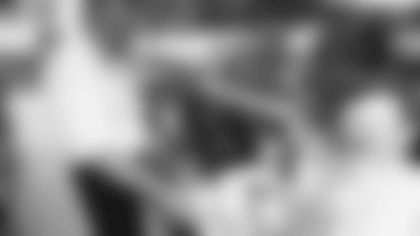Ann Litt, MS, RD, LD, is the Redskins' team nutritionist and works closely with players on healthy meal choices and proper hydration before, during and after games. She spoke with Redskins.com TV's Larry Michael recently in an exclusive interview:
Q: How long have you been a nutrionist and what made you get into this line of work originally?
A: "I've been a nutrionist for almost 30 years. I have a love for eating well. I was also an athlete growing up and so I know the value of eating well and how it translates to performing well athletically."
Q: Do pro football players eat the same kind of foods during the offseason as they would during the regular season?
A: "Yes, they do, but this is the time for them to really tweak their diet. So those players who actually need to gain weight, this is the time we want to work with them. It's the same for players who need to lose weight. Basically, they eat the same kind of foods, but we're tweaking how much and when they eat."
Q: Most people fall under the category of needing to lose weight. But football players such as offensive and defensive linemen may need to put some bulk on at certain times of the year. How do football players gain weight in a good, safe way?
A: "It's a matter of eating and drinking properly. I would want them to eat 4-6 meals a day and drink a really good high calorie beverage. What we're going to do is look at what kind of weight they put on. We have a 'Bod Pod' which measures percent of body fat. We make sure that the weight they're gaining isn't just fat, that it's good lean body mass."
Q: Does eating specifically red meat cause you to gain weight?
A: "You know, that's kind of a fallacy. It takes a lot of food to put on weight. You can overeat on cucumbers or you can overeat on Twinkies. Both will put weight on. What I'm trying to do is make sure the football players are eating the right kind of foods to put on body mass and working out well."
Q: For children, it's often said they should eat a meal after a little-league game. Is that true? Do they need to eat a snack between periods of, for example, a soccer match?
A: "I think it depends on the age of the child and the level that they're playing at. If it's a 45-minute game and the kid plays only about 10 or 15 minutes, then they really don't need to be refueling during competition. But some athletes who work out for 60 minutes in high, intense situations, I really do want them eating or at least drinking. Drinking water or a sports drink during high-level competition is probably helpful. With the players, one of the most important things is what they eat after a workout. It's called recovery nutrition and that is the time when they can really make a difference in how they feel and how they refuel their muscles. With recovery nutrition, what they eat afterwards is probably as important as what they eat before."
Q: Is there a general rule of thumb what to eat after a workout?
A: "Absolutely. First of all, there's a window of time--it's about 15-30 minutes--when your muscles act like a sponge and they are very reception to what you eat. If you put a Twinkie in them, that's probably not the best choice. What your muscles are looking for is food that is about four-parts carbohydrates and one-part protein. Both of those are helpful. There are some commercial sports beverages which we use, but actually, chocolate milk and a peanut butter sandwich is great, too. But that's for somebody who's doing an intense workout. We're not talking about a recreational athlete."
Q: Is it okay to drink a sports drink like Gatorade when you're not working out?
A: "I like Gatorade for before, during and after a sports event, but just as a beverage during the day, it's totally unnecessary. Gatorade has sugar and electrolytes. It's designed to make you drink a lot more. So if you have a problem with someone who is not drinking enough water, it's perfect because it makes you drink more. For the recreational athlete or someone who is just going out for a run, they really don't need Gatorade. I'd like to see all of us--kids, athletes, whomever--drinking more water."
Q: I'm going to ask about some foods and drinks and whether they are healthy for you. First: How good or bad is eating ice cream?
A: "Well, it's all about how much and when. It's probably not a good idea to eat a bowl of ice cream right before you go to bed, unless you want to gain weight."
Q: What about drinking alcohol? Should athletes avoid drinking alcohol or is it all about moderation?
A: "It's all about moderation. The problem with drinking alcohol before any kind of heavy exercise is that it's pretty dehydrating. So I definitely don't recommend it before excercise. But the occasional beer or glass of wine around dinnertime is perfectly fine."
Q: How about peanuts? Is eating peanuts good for you?
A: "That's a really good question. Peanuts are a healthy, good snack. However, they are very high in calories. So it's a food I like to use for those pro football players who want to gain weight."
Q: What are your thoughts on consuming diet sodas?
A: "I wouldn't want it to replace water. For healthy choices, I'm not a big supporter of regular or diet soda, but I don't think drinking a can of diet soda once in a while will be a real problem."
Q: How about eating sushi?
A: "Sushi is great for you. I'm a big fan of eating sushi and actually a lot of the players are, also."
Q: Do players come to you during the season asking for advice?
A: "Yes, especially if they are having a problem with endurance or if they are having a problem maintaining weight. During the offseason is really when I like to get the work in with the players. Some of the young guys, when they first get here, they might not know how to make a dinner. We offer them breakfast and lunch during the season, but I want to make sure that when they leave here what they're eating is just as healthy. For some of them, I'll take them on grocery store tours to show them how to shop. Some of these younger players have never been to a grocery store in their life. So we'll take them and give them a shopping list and some recipes. For some of them, I've arranged a personal chef service."













